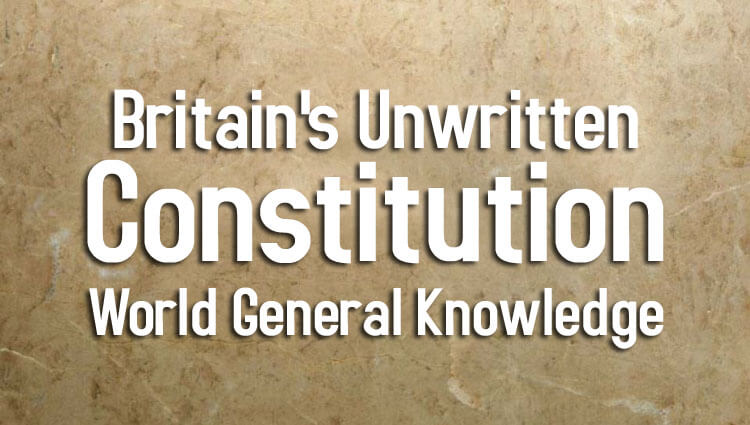Britain’s Unwritten Constitution | World General Knowledge
Unlike most modern states, Britain does not have a codified constitution but an unwritten one formed of Acts of Parliament, court judgments and conventions. Professor Robert Blackburn explains this system, including Magna Carta’s place within it, and asks whether the UK should now have a written constitution.
Statute laws |Britain’s Unwritten Constitution
Statute laws are Acts of Parliament. They are written laws and include rules of major importance for the history of the country, e.g. the Bill of Rights or the European Community Act. They also deal with the electoral system, e.g. the Representation of the People Acts, and with the composition and functioning of Parliament, e.g. the Parliament Acts. Other acts relate to the monarchy, e.g. regulating the succession to the throne, or are concerned with civil liberties, e.g. the Habeas Corpus Act, or the Theatre Act of 1968, which abolished theatrical censorship.
Common law|Britain’s Unwritten Constitution
Common law is the body of traditional, unwritten laws of England, based on judges’ decisions (sometimes referred to as “case law”) and custom. They have proved particularly important in relation to civil liberties, such as the advancing of the Habeas Corpus Act, which orders that a person should be told by a judge why he or she is being held in custody. These laws also refer to the Royal prerogative, i.e. the special rights of kings and queens, e.g. the right to appoint and dismiss ministers, dissolve Parliament, to assent to bills, etc.
Conventions|Britain’s Unwritten Constitution
Conventions are basically rules that have developed during the centuries or may have come into existence only recently. Although they are considered binding, they cannot be enforced by the law courts. There is no statute law or common law that says there must be a prime minister or a cabinet; they exist because of conventions – just as it is a convention that a government, if denied a vote of confidence by the House of Commons, must resign or dissolve Parliament.
Read also: Important World General Knowledge One Liners
Some conventions are far more important than most of the statutes or common laws: e.g. the convention that the monarch assents to a bill passed by both Houses of Parliament as compared with the theoretical right to deny consent. As there is no Supreme Court in Britain to enforce the conventions, their validity depends solely on the fact that the electorate and the elected consider them to be binding constitutional behaviour.
Conventions are generally accepted rules for ensuring that the Constitution is adapted to prevailing conditions and that the abuse of public power is restrained. This is especially important, since the British Constitution can be amended in the same way as any other statute law.
If a minimum of 40 members of the House of Commons are present and arrive at a simple majority decision, the Constitution could be changed. Conventions, of course, prevent such abuse.
Constitutional Landmarks|Britain’s Unwritten Constitution
1215 Magna Carta|Britain’s Unwritten Constitution
- 1265 First Parliament summoned to advise the king; distant forerunner of representative parliament.
- 1350 Parliament divided into House of Lords and House of Commons
- 1628 Petition of Rights: King acknowledges ancient rights of his subjects, such as the citizen’s right not to be taxed without parliamentary consent or not to be imprisoned arbitrarily.
- 1679 Habeas Corpus Act: Legal order requiring somebody who holds somebody else prisoner to bring this person before a court, together with grounds for his or her detention, so that the court can test the legality of the detention.
Check also: World Geography MCQs
1689 Bill of Rights|Britain’s Unwritten Constitution
- 1707 Act of Union with Scotland: Created a United Kingdom of Great Britain uniting England and Scotland and establishing a new UK Parliament.
- 1832 Great Reform Bill: The necessary consequence of the Industrial Revolution. As home based and agricultural trades gave way to factory-based industries, the population was redistributed and the old system of representation in disorder. This first Reform Bill removed representation from a large number of depopulated (“rotten”) boroughs and gave it to important towns such as Manchester and Birmingham. It also identified the right to vote with economic achievement, as it gave the vote to householders and shopkeepers who paid more than £10 a year in rent.
- 1867 Second Reform Bill: Franchise extended to working classes in towns.
- 1884 Third Reform Bill: Household suffrage extended to voters in the counties; about 63% of the adult male population now had the right to vote.
- 1911 Parliament Act: Consent of House of Lords to money bills no longer necessary.
- 1918 Fourth Reform Bill: Franchise to all men over 21 and to all women over 30 years of age; plural voting – the right of shop owners, factory owners etc. to cast more than one vote – restricted.
- 1928 Equal Franchise Act: Voting age for women reduced from 30 to 21 years.
- 1948 Representation of the People Act: Established the principle “one man one vote” by abolishing the extra votes belonging to owners of shops, factories etc., and by abolishing the university seats in the House of Commons.
- 1949 Parliament Act: Asserted the primacy of the House of Commons in the event of conflict with the House of Lords.
- 1958 Life Peerage Act: Permitted the title “Life Peer” to be given to people for the rest of their lifetime, thus enabling them to sit in the House of Lords.
- 1963 Peerage Act: Allowed hereditary peerages to be disclaimed.
- 1969 Representation of the People Act: Voting age lowered to 18.
- 1972 European Community Act: Made Britain a member of the Common Market.
- 1976 Race Relations Act: Recognized legal rights of racial minorities, established the Commission for Racial Equality. |Britain’s Unwritten Constitution
Before your leave Check Other World General Knowledge Related Materials
- Global Giants: Exploring Prominent International Organizations
- 10 Surprising Facts About the Human Brain You Didn’t Know
- World Labour Day Tribute: Honouring Workers
- World Health Day | Building a Fairer, Healthier World
- The World Wars: A Global Struggle for Power and Ideology
- Important World General Knowledge One Liners
- An Overview of the Punjab Assembly: How it Works and what it does
- 10 Attractive Facts About Pakistan You Must Know
- Universe Short Question Answer (Set-I) | World General Knowledge
- Handwritten Notes for FIA Tests (PDF File)







